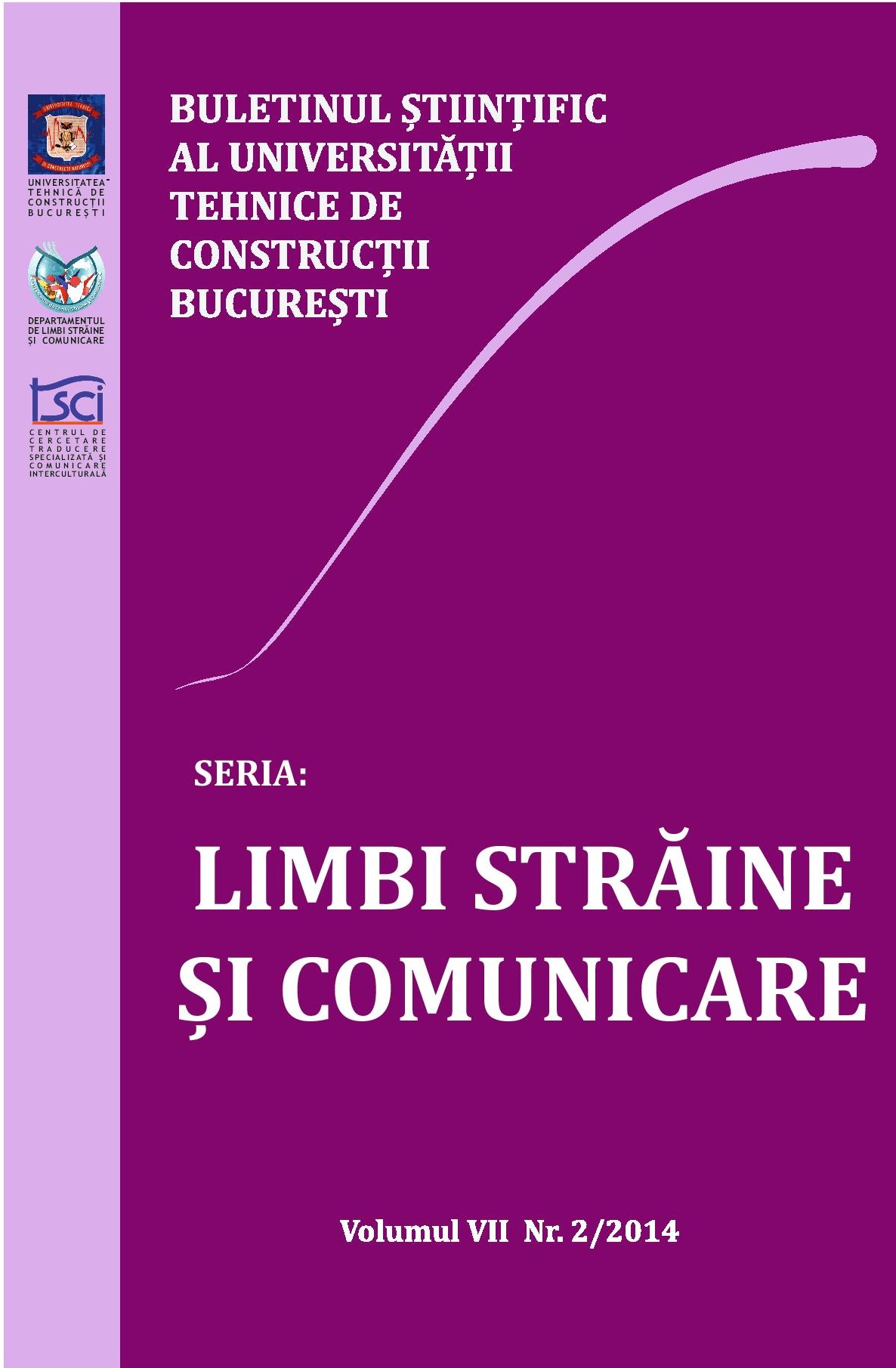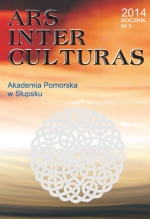
We kindly inform you that, as long as the subject affiliation of our 300.000+ articles is in progress, you might get unsufficient or no results on your third level or second level search. In this case, please broaden your search criteria.

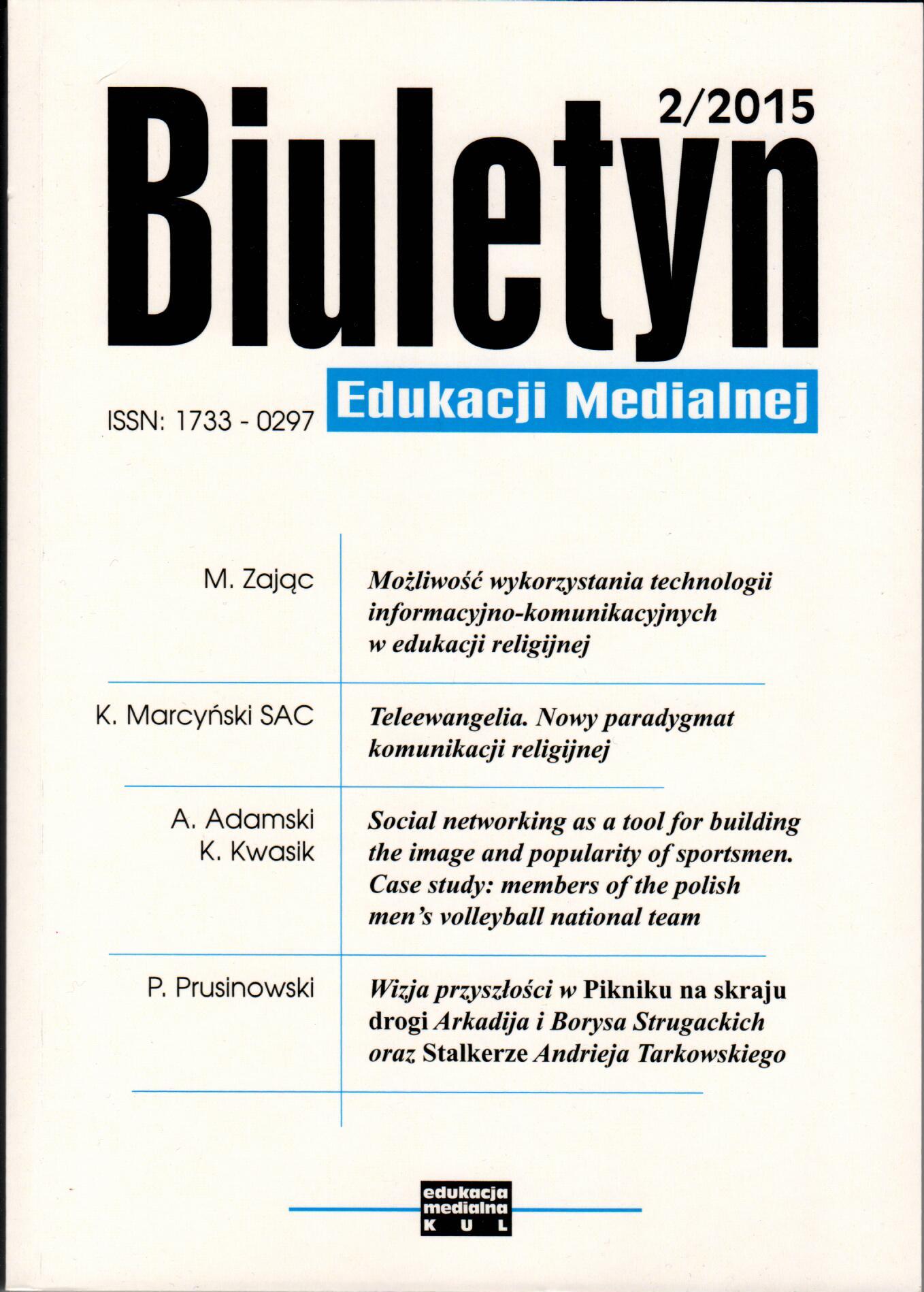
The Environmental Symposium took place at Centre of Culture and ChristianFormation in Jaroslaw from 16th to 17th October 2015 under the title: „50 years ofthe World Day of Social Communications. Idea and basic thoughts”. The authorsof the papers have passed since the genesis of the assumptions purposes to therelationship behavior in the Pope’s message. They noticed historical tutorial andalso pastoral dimension of these documents.
More...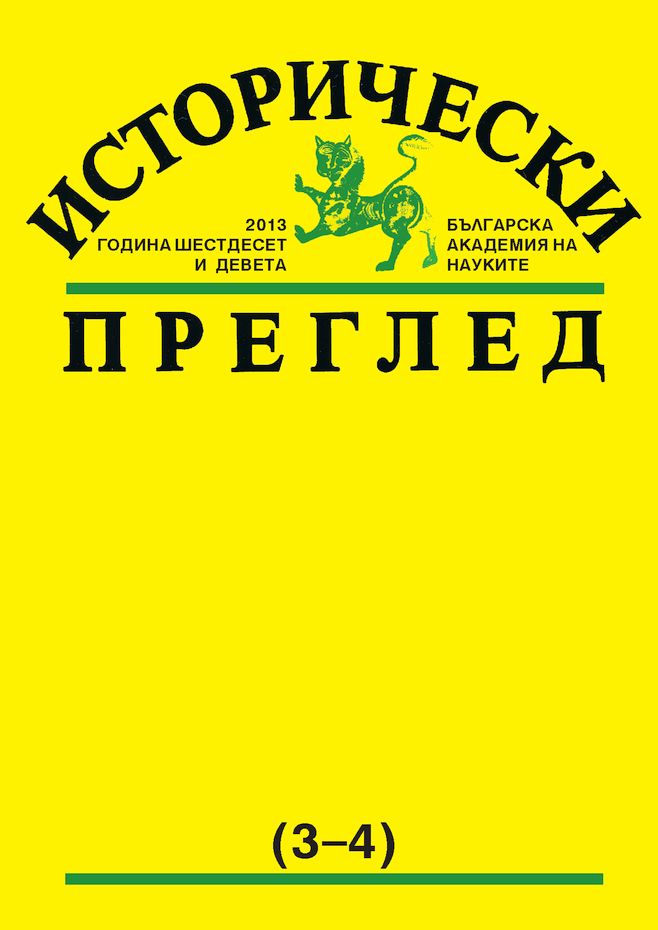


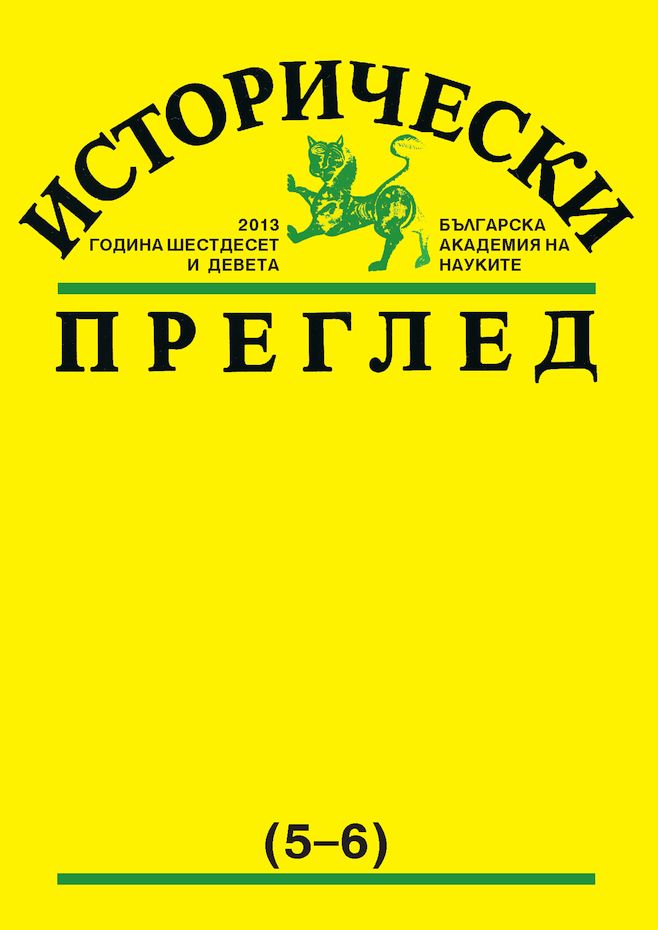
The article traces part of the discussions in Western studies about the meaning of the terms “Americanization” and “Sovietization”. The accents are placed on the impact of the promoted “American values” in Eastern Europe, especially in the USSR. More details are revealed about the mechanisms of influence used by the US Missions in Bulgaria after 1945 such as providing free access to the library of the political representation of the United States; donation of books and movies to various departments of the Sofia University, community centers and even Fatherland Front organizations. By overcoming the crisis in diplomatic relations of February 1950, despite ideological restrictions educational exchanges with the exchange of students, graduate students, and lecturers were restored after 1959. Pro-Western propaganda was also carried out through the activity of Radio “Voice of America”, Radio“Free Europe”, and BBC. The grueling confrontation between East and West gradually provoked ideas for “detente” that removed barriers between the two poles, but also raised requirements for adjustments in the behavior of the superpowers.
More...
The second half of the 1940s is a crucial transition period in establishing totalitarian control of society. The decor of pluralism and parliamentarism brought specific color in the life of Bulgarians in the first years after September 9, 1944. The Communist Party in Bulgaria,aided by the entry of the Red Army in Bulgaria and the arrangements between the members of the anti-Hitler coalition, actually became ruling political force, but did not immediately establish a dictatorship of the proletariat in the form of Soviet rule. The destruction of the old authority structures was followed by a period of existence of a parallel unregulated power at all levels. The orchestrated political pluralism did not provide for any serious political role for the coalition partners of BRP (k), whose political platforms detached from the historical context, were quite harmless. A side effect in the movement towards a totalitarian society was the emergence of opposition, which briefly stirred Bulgarian political space and created the illusion of political pluralism in the country. The regime defined itself as a “people’s democracy”, but behind the propaganda thesis about the authority practice shows violation of pluralism, constant interference in the internal life of the other parties, strict regulation of all components of public and political life, criminalization of dissent, including the whole society into state organizations working under the ideological and political leadership of the Communist Party. The affirmation of the communist regime was accompanied by the formation of party-bureaucratic class which acquired the status, powers and privileges, access to which remained limited for members of other parties. Corrupting party cadres, sensitive to domestic benefits, began in the first months after September 9 and gradually became a dominant practice that turned into hallmark of the regime and existed until the end of the 1980s.
More...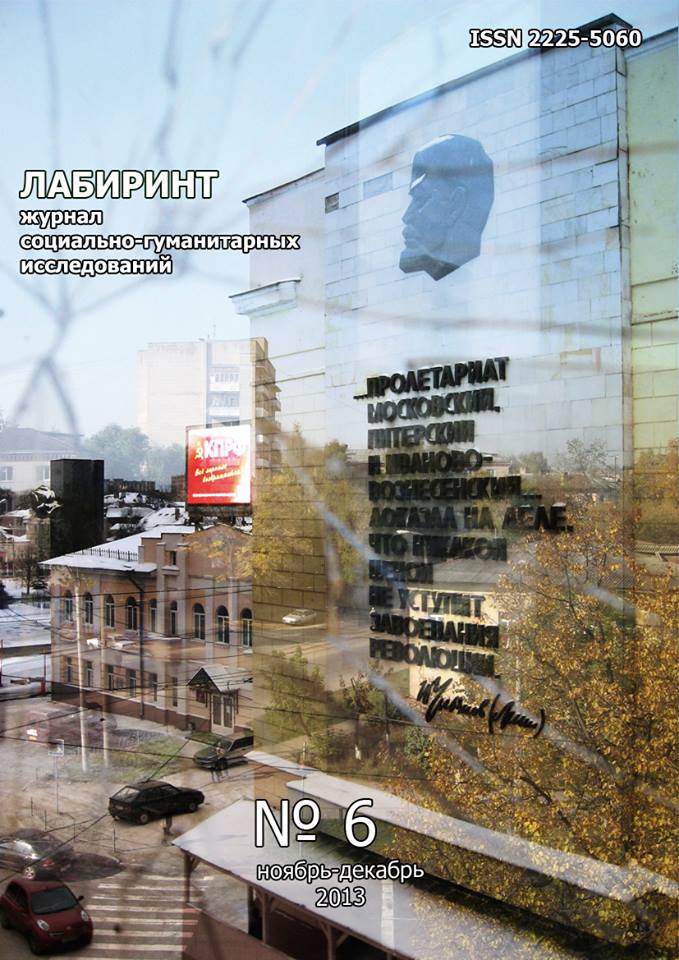
25 – 26 апреля 2013 года в Уральском федеральном университете имени первого президента России Б.Н. Ельцина на базе Института гуманитарных наук и искусств, Инсти- тута социально-политических наук и Межвузовского центра по преподаванию культуроло- гии в технических вузах состоялся третий научный семинар с международным участием междисциплинарного проекта «Советский мир: конформизм и конформисты», который назывался «Левая идея в поле советского искусства». В рамках этого проекта, иницииро- ванного профессором Т. А. Кругловой и профессором М. А. Литовской в апреле 2012 года, уже были проведены два всероссийских научных семинара (см. «Лабиринт» №№ 2, 5 за 2012 г., № 1 (6) за 2013 г.).
More...
1–4 июля 2013 года при поддержке Института литературы имени Тараса Шевченко Национальной академии наук Украины на базе Нежинского государственного университе- та имени Николая Гоголя состоялся ІІІ Международный научный семинар из серии «Studia Sovietica». Тема этого семинара — «Хронология советской культуры: константы и транс- формации».
More...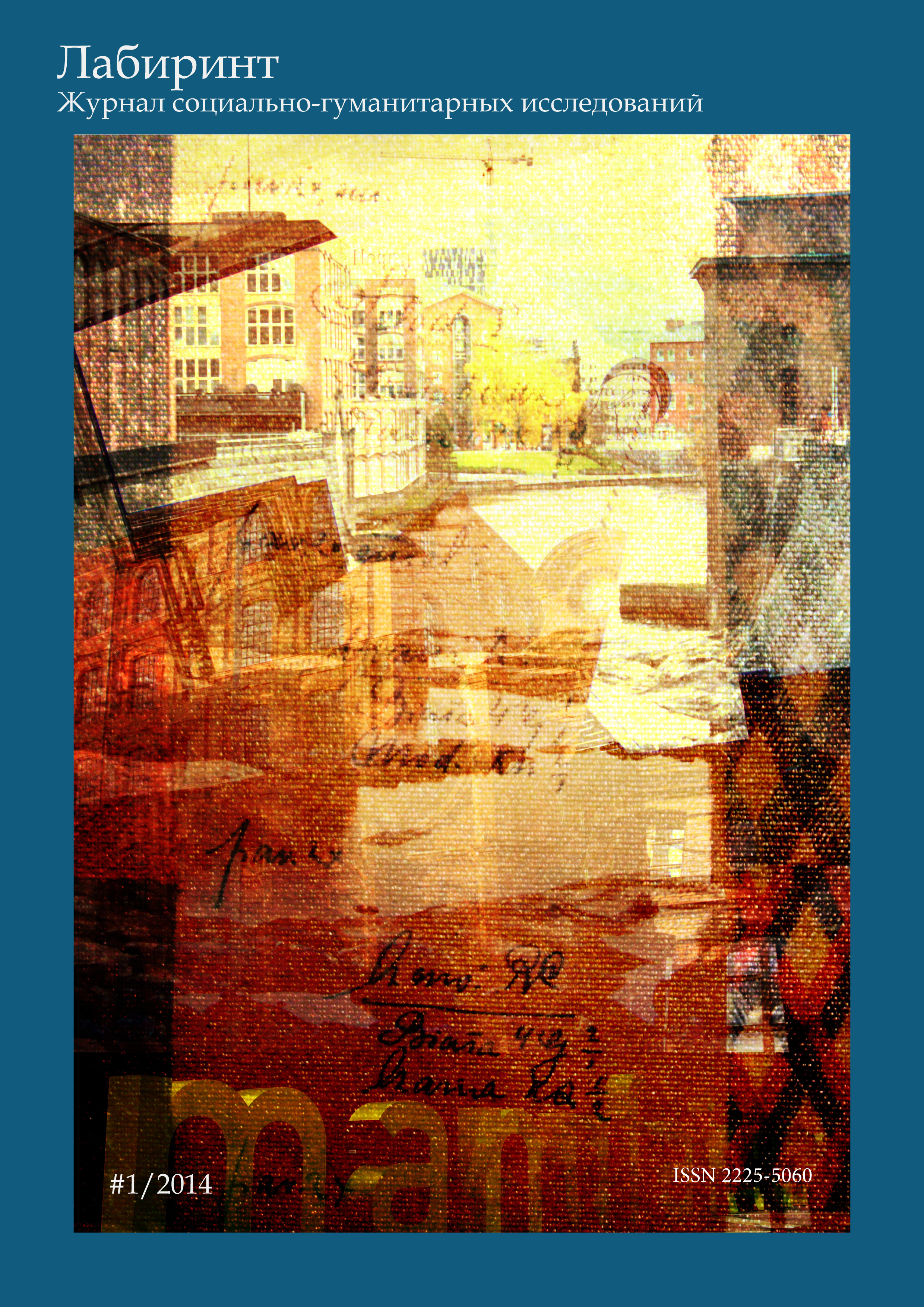
Конференция «Повседневность российской провинции (XIX – XX вв.)», инициированная центром устной истории и визуальной антропологии Пермского государственного гуманитарного педагогического университета и проведенная 5-6 ноября 2013 г. кафедрой новой и новейшей истории России этого университета позволила рассмотреть два определяющих феномена национальной ментальности в общем ракурсе. Несмотря на то, что последнее пятнадцатилетие гуманитарной науки оказалось достаточно продуктивным в описании феноменов провинции (провинциальных и локальных текстов, провинциальных сюжетов и сценариев) и повседневности (эмпирической, эстетической, трудовой, экзистенциальной и т.д.), представленные на конференции исследования нельзя назвать вторичными. И хотя большинство докладов было связано с повседневностью XX века — периодом истории, когда провинция уходит на периферию и становится имплицитной темой культуры — результаты конференции можно распространить (учитывая необходимые коррективы) на предшествующие периоды и, в частности, на XIX век.
More...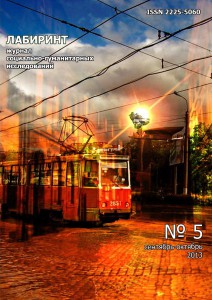
9–10 октября 2013 г. в Центре индийских исследований Института востоковедения Российской академии наук (ЦИИ ИВ РАН) состоялась третья Всероссийская конференция междисциплинарного характера «Под небом Южной Азии», подготовленная при поддержке гранта РГНФ, проект № 13-01-00096. В этом году для обсуждения была предложена тема «Территория и принадлежность».
More...
28–29 октября 2013 г. в Институте всеобщей истории РАН состоялась научная конференция «Перенос столицы: Исторический опыт геополитического проектирования», организованная центром исторической географии и центром по подготовке «Всемирной истории» ИВИ РАН.
More...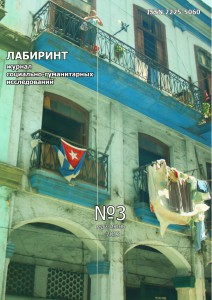
Апрельскую конференцию «Художник и музей: пути взаимодействия» в Одессе организовали совместно кафедра культурологии гуманитарного факультета Одесского национального политехнического университета и Музей современного искусства Одессы. На обеих площадках за три рабочих дня прозвучали более сорока выступлений. В целом это массив можно тематически разделить на две группы.
More...
Два года назад город Иваново стал местом про- ведения научного семинара, посвящённого про- блеме эволюции промышленного города. Тогда организаторы отталкивались от образа Манче- стера, как проекта моноиндустриального (тек- стильного) города, реализованного в разных странах. Второй международный семинар поста- вил на повестку дня более широкий круг вопросов: индустриальный ландшафт в постиндустриальном контексте; эксплуатация индустриального простран- ства; идеология и мифология индустриальных ландшафтов в искусстве и других символических практиках; город фабрика/город-завод: опыт и перспективы индустриального туризма; Человек городской и чело- век индустриальный (антропологический и социаль- нопсихологические аспекты существования в инду- стриальной среде); быт и бытие: знаково- символические коды индустриальных ландшафтов.
More...
Российская ассоциация исследователей женской истории (РАИЖИ, www.rarwh.ru), Российский национальный комитет Международной федерации исследователей женской истории, сектор этногендерных исследований Института этнологии и антропологии им. Н. Н. Миклухо-Маклая РАН, Рязанский государственный университет им. С. А. Есенина, Рязанская областная универсальная научная библиотека им. М. Горького и Рязанский областной совет женщин при финансовой поддержке Глобального фонда для женщин, Фонда Ф. Эберта и Фонда М. Прохорова провели 9—12 октября 2014 г. очередную (седьмую) международную научную встречу. Название прошедшей конференции — «Пол, политика, политкультурность: гендерные отношения и гендерные системы в прошлом и настоящем».
More...
2—6 июля 2015 г. в Екатеринбурге состоялся традиционный, уже одиннадцатый, конгресс антропологов и этнологов России. Самой многочисленной секцией конгресса оказалась секция «Женское vs мужское в культурах мира. Русская культура и женская история сквозь призму мужского и женского», доклады которой охватили более чем три века российской и мировой истории. Работа секции была нацелена на обсуждение проблем, связанных с влиянием фактора пола на конкретно исторические формы коллективных и инди- видуальных изменений, на разговор о влиянии гендерного порядка на факты событийной истории, на дискуссии о связи проявлений гендерных асимметрий с принадлежностью к социальному слою, конфессией, политической и конъюнктурной составляющими.
More...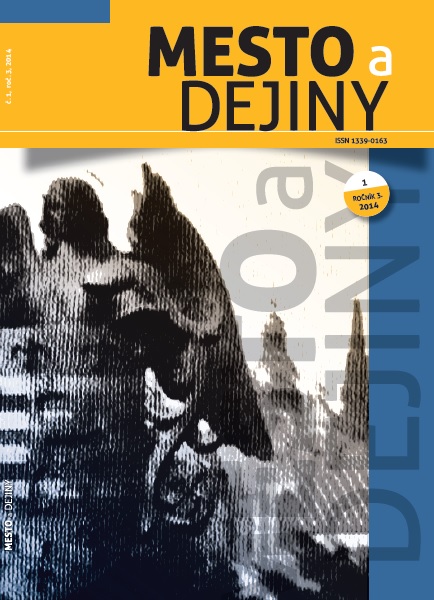
GLEJTEK, MIROSLAV. HERALDIKA: ÚVOD DO ŠTÚDIA ERBOV. HOŘEJŠ, MILOŠ – KŘÍŽEK, JIŘÍ ET AL. AUTOMOBILISMUS A ŠLECHTA V ČESKÝCH ZEMÍCH 1894 – 1945. HOŘEJŠ, MILOŠ. PROTEKTORÁTNÍ PRAHA JAKO NĚMECKÉ MĚSTO : NACISTICKÝ URBANISMUS A PLÁNOVACÍ KOMISE PRO HLAVNÍ MĚSTO PRAHU. KEMPNÁ, LUCIE. ŠKODOVKY DO CELÉHO SVĚTA: EXPORT AUTOMOBILŮ L&K A ŠKODA V LETECH 1905 – 1991. BEDNÁROVÁ, MARCELA. SYMBOLY A MÝTY CHORVÁTSKEHO NÁRODNÉHO HNUTIA: FENOMÉN ILYRIZMU. VARGA, LAJOS. HÁBORÚ, FORRADALOM, SZOCIÁLDEMOKRÁCIA MAGYARORSZÁGON 1914. JÚLIUS – 1919. MÁRCIUS. [VOJNA, REVOLÚCIA, SOCIÁLNA DEMOKRACIA V UHORSKU. JÚL 1914 – MAREC 1919].
More...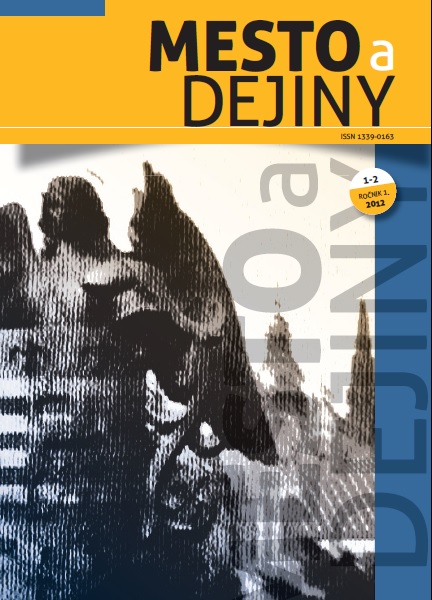
KONFERENCIA BITKA PRI ROZHANOVCIACH V KONTEXTE SLOVENSKÝCH A UHORSKÝCH DEJÍN. KONFERENCIA SLOVENSKO V ROKOCH NESLOBODY 1938 – 1989 II. OSOBNOSTI ZNÁME – NEZNÁME. PÄŤ MESIACOV AUTONÓMIE. (VÝCHODNÉ) SLOVENSKO MEDZI 6. OKTÓBROM A 14. MARCOM. DISKUSNÝ VEČER ÚSTAVU PAMÄTI NÁRODA. ZASADNUTIE NEMECKO-ČESKEJ A NEMECKO-SLOVENSKEJ KOMISIE HISTORIKOV – DOKTORANDSKÝ WORKSHOP. KOŠICE – INŠTITUCIONÁLNA ZÁKLADŇA KULTÚRY, ŠKOLSTVA A VEDY (K 140. VÝROČIU ZALOŽENIA VÝCHODOSLOVENSKÉHO MÚZEA V KOŠICIACH). PREZENTÁCIE MEDZINÁRODNÉHO PROJEKTU ALTERNATÍVNY SPRIEVODCA HISTÓRIOU KOŠÍC 2013. STRETNUTIE MLADÝCH HISTORIKOV II. PRIESEČNÍKY SPOLOČNEJ HISTÓRIE ŠTÁTOV V4.
More...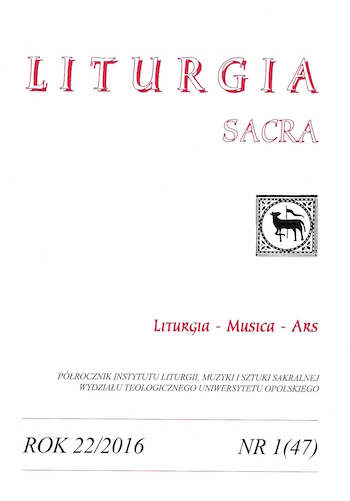
Review of: Ks. Mateusz Potoczny - KAROL LITAWA, I riti propri del Papa celebrati nella Capella privata durante la Settimana Santa nei secoli XII e XIII, Rzym: Pontificio Istituto Liturgico 2014, 293 s., ISBN 978-83-62934-57-7. Ks. Mateusz Potoczny - GUIDO FUCHS, Weekend a liturgia. Między kościelną Tradycją a współczesnym przeżywaniem czasu, Kraków: „Homo Dei” 2014, 198 [1] s., ISBN 978-83-64451-14-0. Ks. Mateusz Potoczny - CZESŁAW KRAKOWIAK, Sakramentalia i błogosławieństwa w liturgii Kościoła (Prace Wydziału Teologii 167), Lublin: TN KUL Jana Pawła II 2015, 194 s., ISBN 978-83-7306-689-2. Ks. Mateusz Potoczny - MAREK CHMIELEWSKI, JANUSZ KRÓLIKOWSKI, Duchowość uczynków miłosierdzia. Materiały duszpasterskie na Jubileuszowy Rok Miłosierdzia (8 XII 2015–20 XI 2016) (Biblioteka Ostrobramska 5), Ostra Brama, Skarżysko-Kamienna: Sanktuarium Matki Bożej Ostrobramskiej 2015, 193 [3] s., ISBN 978-83-7847-300-8. Ks. Mateusz Potoczny - KAZIMIERZ MATWIEJUK, Triduum paschalne. Trzy noce Chrystusa zdradzonego i ukrzyżowanego, który zmartwychwstał, Siedlce: „Unitas” 2015, 249 [1] s., ISBN 978-83-61071-91-4. Ks. Mateusz Potoczny - WALDEMAR JAN PAŁĘCKI MSF, Pytanie o liturgię. Misterium liturgii w życiu Kościoła, przedm. Zbigniew Wit, Lublin: Wydaw. KUL 2015, 208 s., ISBN 978-83- 7702-956-5. Ks. Mateusz Potoczny - PIOTR ROSZAK, Mozarabowie i ich liturgia. Chrystologia rytu hiszpańsko-mozarabskiego, Toruń: Wydaw. Naukowe UMK 2015, 317 s., ISBN 978-83-231-3342-1. Ks. Mateusz Potoczny - GRZEGORZ ŚMIECIŃSKI, Liturgia po Soborze Watykańskim II w (archi)diecezji katowickiej, przedm. Andrzej Żądło, Katowice: „Emmanuel” 2015, 326 s., ISBN 978- 83-63757-88-5. Ks. Piotr Wiśniewski - IRENEUSZ PAWLAK, Laudes et Vesperae Dominicales. Chwalby Poranne (Jutrznia) i Nieszpory na niedziele okresu zwykłego z towarzyszeniem organowym, red. S. Garnczarski, Tarnów: Wydawnictwo Biblos 2015, 124 s., ISBN 978-83-7793-355-8. Ks. Piotr Wiśniewski - WIESŁAW HUDEK,PIOTR WIŚNIEWSKI, Cantare amantis est. Wieloautorska monografia naukowa z okazji 80. urodzin Ks. Prof. dr. hab. Ireneusza Pawlaka, Lublin: Wydawnictwo „Polihymnia” 2015, 615 s., ISBN 978-83 7847-253-7. Ks. Piotr Wiśniewski - TADEUSZ BRATKOWSKI, Officium divinum de tempore w rękopiśmiennych antyfonach zakonów benedyktyńskich w Polsce od XV do XIX wieku, Rzeszów: Wydawnictwo Uniwersytetu Rzeszowskiego 2013, 336 s., ISBN 978-83-7338-894-9. Ks. Piotr Wiśniewski - Kasjodor (Flavius Magnus Aurelius Cassiodorus), Institutiones musicae. Zasady muzyki, Z języka łacińskiego przełożył, wstępem i komentarzem opatrzył oraz słownik sporządził Lucjan Dyka, Rzeszów: Wydawnictwo Uniwersytetu Rzeszowskiego 2015, ss. 209, ISBN 978-83-7996-173-3. Ks. Franciszek Koenig - MARIA SZYMANOWICZ, Polska bibliografia organów, t. II, Lublin: Wydawnictwo Muzyczne „Polihymnia” 2014, 479 s., ISBN 978-83-7847-241-4. Ks. Franciszek Koenig - GRZEGORZ POŹNIAK, Katalog organów diecezji opolskiej, cz. II (Z Dziejów Kultury Chrześcijańskiej na Śląsku 86), Opole: Redakcja Wydawnictw Wydziału Teologicznego UO 2015, 264 s., ISBN 978-83-63950-60-6. Ks. Franciszek Koenig - ANDRZEJ MIKOŁAJ SZADEJKO, Styl i interpretacja w utworach organowych Friedricha Christiana Mohrheima (1719?–1780) i Johanna Gottfrieda Müthela (1728–1788). Zagadnienia wykonawcze i stylistyczne muzyki organowej w regionie południowego Bałtyku w osiemnastym wieku, Gdańsk: Akademia Muzyczna im. Stanisława Moniuszki 2010, 310 s., płyta CD, ISBN 987-83-925967-6-9. Ks. Franciszek Koenig - GRZEGORZ POŹNIAK, Opolski krajobraz organowy, Opole: Diecezjalny Instytut Muzyki Kościelnej 2015, 95 s., ISBN 978-83-7342-474-6. Ks. Franciszek Koenig - PIOTR KULITA, Muzyka w sakramentach inicjacji chrześcijańskiej po Soborze Watykańskim II na podstawie obrzędów w języku polskim, Lublin: Wydawnictwo „Polihymnia” 2015, 338 s., ISBN 978-83-7847-254-4. Ks. Franciszek Koenig - GRZEGORZ POŹNIAK,PIOTR TARLINSKI (red.), Śląskie organy IV. Materiały z konferencji organoznawczej zorganizowanej przez Katedrę Muzyki Kościelnej i Wychowania Muzycznego Wydziału Teologicznego Uniwersytetu Opolskiego oraz Diecezjalny Instytut Muzyki Kościelnej w dniu 18 marca 2015 (Sympozja 87), Opole: Redakcja Wydawnictw Wydziału Teologicznego UO 2015, 317 s., ISBN 978-83- 63950-57-6. Ks. Piotr Szlufik SDB HIERONIM CHAMSKI,MIROSŁAW WYSZOGRODZKI SDB (opr.), Tobie Panie zaufałem. Akompaniamenty, Płock: Wydawnictwo „Hejnał” 2015, 222 s., ISMN 979-0- 801-501-31-8. Ks. Piotr Szlufik SDB - MIROSŁAW WYSZOGRODZKI SDB (wybór i opr.), Śpiewy religijne. Towarzyszenia organowe, Płock: Wydawnictwo „Hejnał” 2015, 417 [3] s., ISMN M-979-0-801501-23-3.
More...